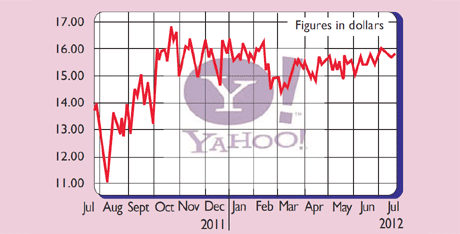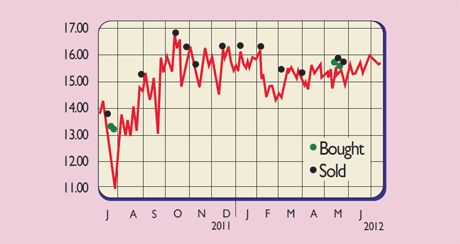Shares in focus: Can Yahoo! regain its former glory?
Yahoo!'s new CEO Marissa Mayer is well-placed to halt the internet media giant's declining revenues. So should you buy the shares? Phil Oakley investigates.
Get the latest financial news, insights and expert analysis from our award-winning MoneyWeek team, to help you understand what really matters when it comes to your finances.
You are now subscribed
Your newsletter sign-up was successful
Want to add more newsletters?

Twice daily
MoneyWeek
Get the latest financial news, insights and expert analysis from our award-winning MoneyWeek team, to help you understand what really matters when it comes to your finances.

Four times a week
Look After My Bills
Sign up to our free money-saving newsletter, filled with the latest news and expert advice to help you find the best tips and deals for managing your bills. Start saving today!
The future of the internet firm rests with the new CEO, says Phil Oakley.
The business
Yahoo! is an internet media company. It makes most of its money by connecting advertisers to their target audiences over the internet. It gets paid for display advertising and for search advertising which involves providing text links to the advertisers' websites.
In order to generate advertising income, Yahoo! focuses on four main areas. It has communications services such as email, instant messaging and Flickr photo sharing. It also has a search engine for browsing the internet and marketplaces for activities such as shopping, travel and cars.
MoneyWeek
Subscribe to MoneyWeek today and get your first six magazine issues absolutely FREE

Sign up to Money Morning
Don't miss the latest investment and personal finances news, market analysis, plus money-saving tips with our free twice-daily newsletter
Don't miss the latest investment and personal finances news, market analysis, plus money-saving tips with our free twice-daily newsletter
The company's media activities are centred around the Yahoo! home page, which remains a very popular internet portal site. This site provides users with information and links on areas such as news, sports and finance. Yahoo! had revenues of $5 billion in 2011.
The history
David Filo and Jerry Yang started the company in 1994 when they were students at Stanford University. It was essentially their guide to the best sites on the internet. Yahoo.com was formally created in 1995. It grew rapidly during the late 1990s as users flocked to its sites to surf the web. Its shares then became part of the dotcom mania: the company was valued at over $100 billion by the end of the decade.
In 2000, Yahoo! arguably made one of its biggest mistakes. It decided not to develop its own search algorithm and licenced one from Google instead. The increased profile this gave Google led to many internet users bypassing Yahoo! altogether for internet searches and allowed Google to become a fierce competitor. After the bursting of the dotcom bubble, Yahoo! tried to make improvements to its service, but time after time it failed to transform its business.
In 2006, the firm apparently had an agreement to buy Facebook, which fell through. It later lost out to Google when trying to buy YouTube and the Doubleclick display advertising business. In 2008, Yahoo! rejected a $45 billion takeover approach from Microsoft. In the last four years, the firm has had four different leaders, all of whom have failed to halt falling sales. Despite this, Yahoo remains one of the most popular portals on the internet.
The chief executive
Marissa Mayer has just been given the top job. Female leaders are a rarity in Silicon Valley, but she has an impressive background in developing web services that people seem to like. Having been the 20th employee at Google, she worked there for the last 13 years and played a major part in developing Google's services, such as its search engine, GMail and Google Maps. She will be paid a salary of $1 million, but could make up to $100 million in share awards if she meets targets and stays for five years something her three predecessors failed to do.
Should you buy the shares?
A lot rests on the ability of the new CEO to put a stop to Yahoo!'s declining revenues. The company has some strengths, particularly its content agreements with ABC, CNBC, Eurosport and digital music provider, Spotify.
But it has to address its weaknesses in internet search as its partnership with Microsoft in this area doesn't seem to be working. It has to develop new services that the likes of Google, Facebook and Twitter do not provide and do them better. Otherwise, Yahoo will remain a declining business where the profits are propped up by cost-cutting and share buy-backs to stop returns to shareholders falling off a cliff.
The key question for investors is: why should they pay 16 times earnings for Yahoo! shares when they can buy Google's better business for less than 14 times? There are no quick fixes for Yahoo! and expecting a quick recovery in its fortunes is a big bet. This is not the right time to buy the shares. Avoid.
The numbers

Stockmarket code:YHOO
Share price:$15.73
Market cap:$19.2bn
Net assets (June 2012):$12.5bn
Net cash (June 2012):$2.4bn
P/e (current year estimate):16 times
Yield (prospective):N/A
What the analysts say
Buy:9
Hold:21
Sell:1
Average price target:$18
Directors' shareholdings

M Mayer:0
T Morse:679,705
R Levinsohn:637,689
Get the latest financial news, insights and expert analysis from our award-winning MoneyWeek team, to help you understand what really matters when it comes to your finances.
Phil spent 13 years as an investment analyst for both stockbroking and fund management companies.
-
 Can US small caps survive the software selloff?
Can US small caps survive the software selloff?US stocks have made their worst start to a year since 1995 relative to a global benchmark. But experts think some sectors of the market are still worth buying.
-
 Review: Eliamos Villas Hotel & Spa – revel in the quiet madness of Kefalonia
Review: Eliamos Villas Hotel & Spa – revel in the quiet madness of KefaloniaTravel Eliamos Villas Hotel & Spa on the Greek island of Kefalonia is a restful sanctuary for the mind, body and soul